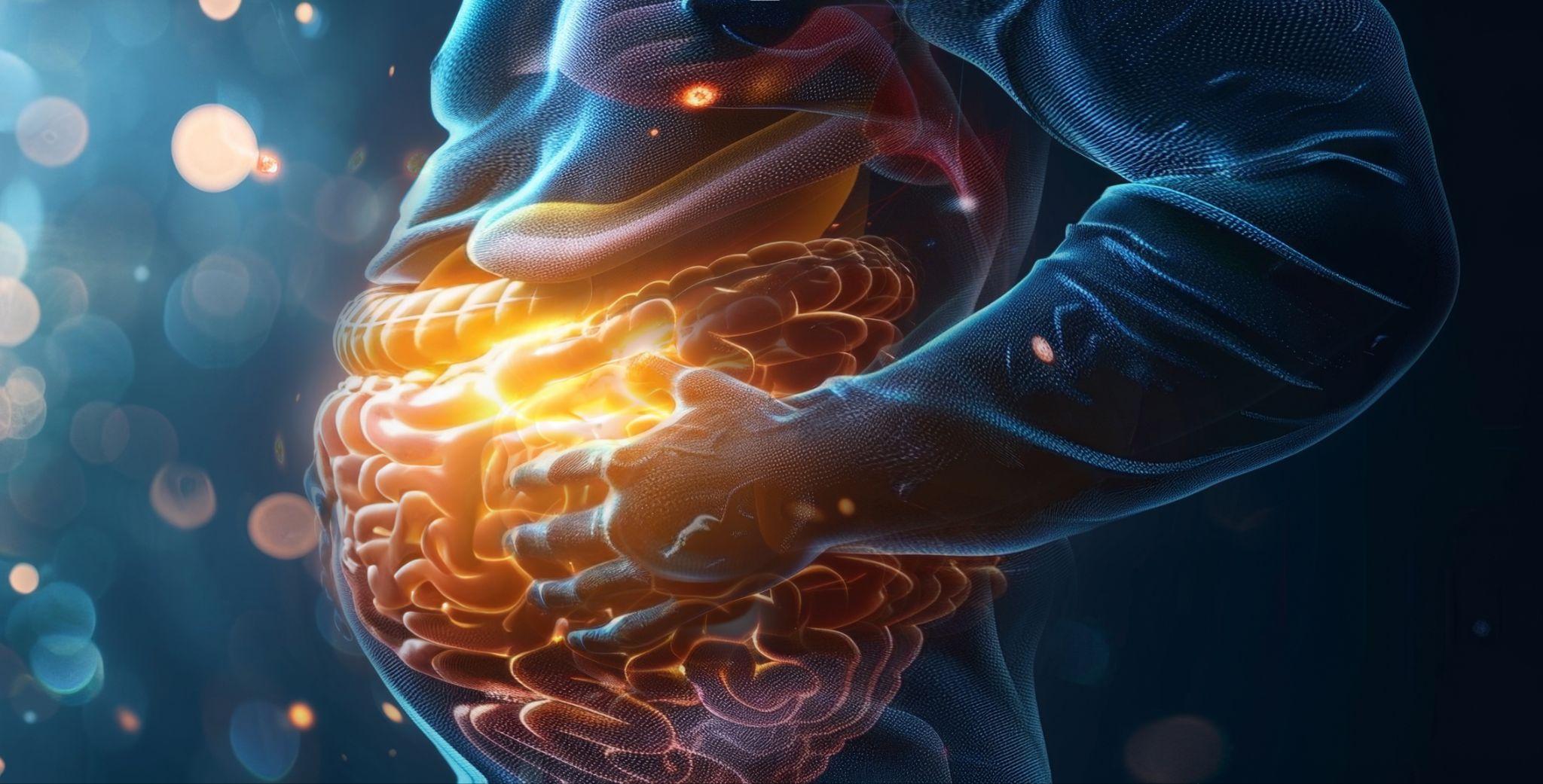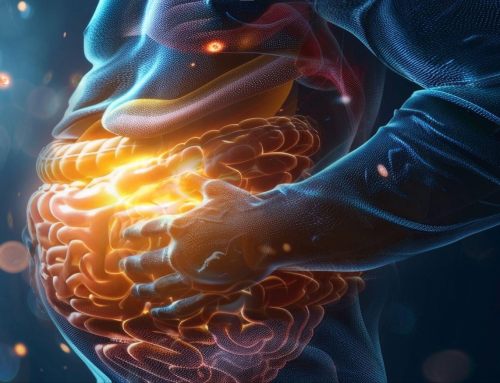Impact of Akkermansia on Healthy Weight and Blood Sugar Metabolism
Research surrounding the microbiome has been explosive in the past decade, and will only continue to emerge, providing novel implications for our health. Specific strains of microbiota have been shown to have specialized roles in the body, and a growing body of research suggests that Akkermansia, a strain of bacteria we have in the microbiome, is significant to our metabolic health. Read on to explore the roles Akkermansia has in modulating this foundational aspect of our health.
A. Muciniphila, a Promising Bacteria with Far-Reaching Benefits
- muciniphila, commonly referred to simply as Akkermansia, is a mucus-degrading strain of gut microbiota comprising approximately 3% of our microbiome. Early in life, this bacteria colonizes in the intestinal tract (1). Age, lifestyle, and diet are all factors that can impede concentrations of Akkermansia, which can affect other areas of health.
- muciniphila supports the integrity of the mucus barrier, a first line of defense of the GI tract. The intestine is lined with mucus, which is significant to the functioning of the GI system and microbiome health. The quality of this mucus layer is integral for digestion, so our body can break down foods into nutrients the body can utilize (2). Akkermansia grows on mucus and therefore is very adaptive in the microbiome ecosystem.
Roles in Modulating Inflammation
Akkermansia has been shown to have substantial roles in modulating inflammation, an integral component of metabolic health. The mechanism in which A. muciniphila exerts its anti-inflammatory effects is multifold, including supporting intestinal permeability, gastrointestinal barrier lining, functioning, and efficacy, as well as healthy gut microbiota composition. Insufficient levels of A. muciniphila are associated with an increase in low-grade inflammation and lipopolysaccharides.
Inflammatory Markers – The Connection With Metabolism
Chronic inflammation contributes to the development and progression of metabolic health conditions, including obesity, type 2 diabetes, and cardiovascular disease.
Inflammation affects metabolic health by disrupting the normal functioning of insulin, which is important in regulating glucose levels. Chronic inflammation can lead to insulin resistance, elevated levels of glucose, and the accumulation of visceral fat, all of which can further wreak havoc on the system. Inflammatory molecules released by adipose tissue in the abdomen contribute to insulin resistance, impaired lipid metabolism, and dyslipidemia (3).
Gut Health Is Metabolic Health
The functioning of the GI tract and the diversity and quality of our microbiota ecosystem are foundational for metabolic health. Poor metabolic health is compounded by systemic inflammation, disrupted gut motility, and altered tight junctions of the GI intestinal barrier. As Akkermansia strengthens the gut lining and reduces intestinal permeability, it is a cornerstone to both our metabolic and gut health.
Metagenomics & Gut Microbiota
The microbiome is a key factor in influencing our metabolic health. The composition of the gut microbiome is related to regulating inflammation and metabolism. Poor diet, insufficient nutrition, medications, and antibiotics all compromise the microbiome. Lack of quality sleep or movement and disrupted circadian rhythm all further contribute to impeded microbiome health.
Remarkably, the gut microbiome consists of 3.3 million genes (4). Therefore, utilizing the microbiome as a targeted area of treatment and intervention can have vast and promising implications in influencing our genes in favorable ways that improve metabolic health.
Akkermansia supports regeneration of the microbiome by improving the gut barrier, activating tight junctions, and supporting gut permeability. Sufficient levels of Akkermansia have been associated with improving markers of metabolism, such as insulin resistance (1). This promising strain of bacteria modulates damage to the intestinal tract and plays supportive roles in gut health, inflammation, and metabolic health. Of particular interest is that Akkermansia has been shown to be effective in supporting metabolic health and has been considered as a beneficial next-generation bacteria. Research indicates that A. muciniphila has been found to be inversely associated with metabolic disorders such as obesity, diabetes, and increased markers of inflammation (1).
Akkermansia has also been found to produce short-chain fatty acids, such as acetate, butyrate, and propionate. This is important as they serve as substrates for other beneficial bacteria in the microbiome (5), and the composition of the GI microbiome is significantly related to inflammation and metabolic health. Short-chain fatty acids support metabolic health through modulation of weight gain and inflammation (6).
Research Highlights: A. muciniphila & Implications for Metabolic Health
Stool samples from individuals with type 2 diabetes showed a reduced abundance of concentrations of A. muciniphila in comparison to those with type 2 diabetes who achieved improved glycemic control (7). This is further indicative of the relationship between Akkermansia and metabolic health. In another study, individuals with obesity who underwent treatments of A. muciniphila had a reduction in a number of markers of compromised metabolic health, including insulin resistance and systemic inflammation (8). This highlights Akkermansia’s integral role in modulating these aspects of health with its specialized functions.
Subsequent research indicates that metabolic conditions, such as type 1 and type 2 diabetes, are both accompanied by changes in intestinal microbiota, such as gut dysbiosis (9, 10). While these conditions have different etiologies, they share a noteworthy increase in inflammatory markers (11). The composition of the gut can induce metabolic changes in the intestinal microbiota associated with compromised metabolic health, as well as impaired gut functioning and intestinal lining. Further literature cites the integral role the gut microbiota has in the pathophysiology of insulin resistance and obesity (12).
Nourish & Support Your Ecosystem – Increase Your Energy, Decrease Your Waistline
Research highlights the significant influence of gut microbiota in modulating metabolic health (1). Addressing metabolic health with functional approaches, such as optimizing the microbiome, has implications for all aspects of our health. Supporting the quality and diversity of the 100 trillion bacteria that colonize and contribute to this important ecosystem is foundational for optimizing metabolism and weight (12).
In addition to exploring this specialized gut bacteria, Akkermansia, there are a number of other ways to support metabolic health. Ensuring we are getting optimal quality and duration of sleep is also imperative to metabolic and gut health, as is stress management, movement, and adequate nutrition.
Inadequate sleep can compromise the gut microbiome and disrupt metabolism, resulting in systemic inflammation and poor metabolic health. What’s more, poor sleep also disrupts the circadian rhythm in the body, which is vital for metabolic health. Poor sleep can increase inflammatory markers in the body, such as C-reactive protein (CRP), amongst others (13).
Chronic stress can drive inflammation and induce gut microbiota changes via the sympathetic nervous system and the HPA axis. It can also impede upon the composition of the gut microbiome, as toxins and metabolites are released, contributing to further inflammation and wreaking havoc on metabolic health (14).
Nutrient-dense foods that support our microbiome and metabolic health include that of an anti-inflammatory diet with high amounts of prebiotics and probiotics. This encompasses high-quality anti-inflammatory fats and proteins as well as sufficient amounts of diverse fruits and vegetables. Prebiotics and probiotics can also support gut health and metabolic health through modifications in microbiota. Plant compounds, like phytonutrients and polyphenols, are also significant for modulating inflammation, metabolic health, and the gut microbiota.
Lack of movement and high amounts of high glycemic index foods, such as refined carbohydrates and heavily processed foods, can all wreak havoc on metabolic and microbiome health, causing inflammation in the system. Being mindful of when we eat and how we sequence our foods is also key in modulating and supporting metabolic health. Consuming our vegetables first, followed by protein, fat, and carbohydrates/sugars, supports healthy glucose metabolism. Intermittent fasting can be a powerful tool, as well as obtaining light in the morning to balance and support circadian rhythm. In fact, spending time outside in nature can actually help to downregulate inflammation (15) as well as cortisol in the body (16); all of which support metabolic health. Finally, being mindful of toxins in the environment, as well as from what we consume and ingest, is also essential in regulating metabolic health.
Akkermansia, The Promising Microbiota You’ll Want To Learn More About
A functional medicine approach to systemic health includes restoring and rebalancing the microbiome. Akkermansia supports gut restoration via the mucous membrane, favorably influencing the ecosystem of the microbiome, digestion, and inflammation, and modulating countless aspects of metabolic health (17). Specialized strains of microbiota, such as Akkermansia, are excellent tools to improve health and have far-reaching benefits in terms of overall systemic, metabolic, and GI health.
To learn more about the fascinating role Akkermansia has in modulating metabolic health through these mechanisms, view this webinar, Unlocking the Power of Akkermansia: Healthy Weight and Blood Sugar Metabolism, in which expert speakers, Philip Oubre, MD, Willem De Vos, PhD, and Jeffrey Bland, PhD discuss this topic at length, providing novel clinical insights into this emerging, vast and promising field of microbiome health.
References:
- Rodrigues VF, Elias-Oliveira J, Pereira ÍS, Pereira JA, Barbosa SC, Machado MSG, Carlos D. Akkermansia muciniphila and Gut Immune System: A Good Friendship That Attenuates Inflammatory Bowel Disease, Obesity, and Diabetes. Front Immunol. 2022 Jul 7;13:934695. doi: 10.3389/fimmu.2022.934695. PMID: 35874661; PMCID: PMC9300896.
- Paone P, Cani PD. Mucus barrier, mucins and gut microbiota: the expected slimy partners? 2023 Nov 24;72(12):e7. PMID: 32917747; PMCID: PMC7677487.
- Yu, Ju-Yeon MDa; Choi, Won-Jun MDa; Lee, Hye-Sun PhDb; Lee, Ji-Won MD, PhDa,∗. Relationship between inflammatory markers and visceral obesity in obese and overweight Korean adults: An observational study. Medicine 98(9):p e14740, March 2019. | DOI: 10.1097/MD.0000000000014740
- Riscuta G, Xi D, Pierre-Victor D, Starke-Reed P, Khalsa J, Duffy L. Diet, Microbiome, and Epigenetics in the Era of Precision Medicine. Methods Mol Biol. 2018;1856:141-156. doi: 10.1007/978-1-4939-8751-1_8. PMID: 30178250.
- Derrien M, Vaughan EE, Plugge CM, de Vos WM. Akkermansia Muciniphila Gen. Nov., Sp. Nov., a Human Intestinal Mucin-Degrading Bacterium. Int J Syst Evol Microbiol (2004) 54:1469–76. doi: 1099/ijs.0.02873-0
- Frost G, Sleeth ML, Sahuri-Arisoylu M, Lizarbe B, Cerdan S, Brody L, et al.. The Short-Chain Fatty Acid Acetate Reduces Appetite via a Central Homeostatic Mechanism. Nat Commun (2014) 5:3611. doi: 1038/ncomms4611 [PMC free article] [PubMed] [CrossRef] [Google Scholar]
- Shih C-T, Yeh Y-T, Lin C-C, Yang L-Y, Chiang C-P. Akkermansia Muciniphila is Negatively Correlated With Hemoglobin A1c in Refractory Diabetes. Microorganisms (2020) 8:1360. doi: 3390/microorganisms8091360 [PMC free article] [PubMed] [CrossRef] [Google Scholar
- Depommier C, Everard A, Druart C, Plovier H, Van Hul M, Vieira-Silva S, et al.. Supplementation With Akkermansia Muciniphila in Overweight and Obese Human Volunteers: A Proof-of-Concept Exploratory Study. Nat Med (2019) 25:1096–103. doi: 1038/s41591-019-0495-2
- Jamshidi P, Hasanzadeh S, Tahvildari A, Farsi Y, Arbabi M, Mota JF, et al.. Is There Any Association Between Gut Microbiota and Type 1 Diabetes? A Systematic Review. Gut Pathog (2019) 11:49. doi: 1186/s13099-019-0332-7 [PMC free article] [PubMed] [CrossRef] [Google Scholar]
- Sato J, Kanazawa A, Ikeda F, Yoshihara T, Goto H, Abe H, et al.. Gut Dysbiosis and Detection of “Live Gut Bacteria” in Blood of Japanese Patients With Type 2 Diabetes. Diabetes Care (2014) 37:2343–50. doi: 2337/dc13-2817 [PubMed] [CrossRef] [Google Scholar]
- Debray-Sachs M, Carnaud C, Boitard C, Cohen H, Gresser I, Bedossa P, et al.. Prevention of Diabetes in NOD Mice Treated With Antibody to Murine Ifnγ. J Autoimmun (1991) 4:237–48. doi: 1016/0896-8411(91)90021-4
- Saad MJ, Santos A, Prada PO. Linking gut microbiota and inflammation to obesity and insulin resistance. Physiology (Bethesda, Md). 2016;31:283–293. doi: 10.1152/physiol.00041.2015.
- Wright KP Jr, Drake AL, Frey DJ, Fleshner M, Desouza CA, Gronfier C, Czeisler CA. Influence of sleep deprivation and circadian misalignment on cortisol, inflammatory markers, and cytokine balance. Brain Behav Immun. 2015 Jul;47:24-34. doi: 10.1016/j.bbi.2015.01.004. Epub 2015 Jan 29. PMID: 25640603; PMCID: PMC5401766.
- Umamaheswaran S, Dasari SK, Yang P, Lutgendorf SK, Sood AK. Stress, inflammation, and eicosanoids: an emerging perspective. Cancer Metastasis 2018 Sep;37(2-3):203-211. doi: 10.1007/s10555-018-9741-1. PMID: 29948328; PMCID: PMC6237279.
- Andersen L, Corazon SSS, Stigsdotter UKK. Nature Exposure and Its Effects on Immune System Functioning: A Systematic Review. Int J Environ Res Public Health. 2021 Feb 3;18(4):1416. doi: 10.3390/ijerph18041416. PMID: 33546397; PMCID: PMC7913501.
- Hunter MR, Gillespie BW, Chen SY. Urban Nature Experiences Reduce Stress in the Context of Daily Life Based on Salivary Biomarkers. Front Psychol. 2019 Apr 4;10:722. doi: 10.3389/fpsyg.2019.00722. PMID: 31019479; PMCID: PMC6458297.
- Yan J, Sheng L, Li H. Akkermansia muciniphila: is it the Holy Grail for ameliorating metabolic diseases? Gut Microbes. 2021 Jan-Dec;13(1):1984104. doi: 10.1080/19490976.2021.1984104. PMID: 34674606; PMCID: PMC8726741.












